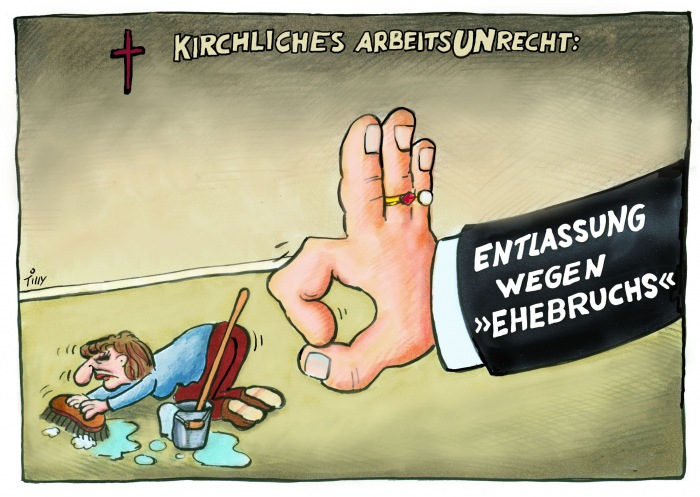"The Beginning of the End of Church Labour Law in Germany!" [1]
Legal experts welcome today's ECJ ruling

ehebruch.jpg [2]
Caricature by Jacques Tilly
The legal experts of the Institut für Weltanschauungsrecht (ifw - Institute for Secular Law) welcome today's judgement of the European Court of Justice (ECJ), which declared the dismissal of a chief physician for "lack of loyalty" to the Catholic Church to be prohibited discrimination according to Art. 21 of the Charter of the European Union. Ingrid Matthäus-Maier, former deputy chairwoman of the SPD parliamentary group, ifw advisory board member, and spokeswoman for the "Kampagne gegen religiöse Diskriminierung am Arbeitsplatz" ("Campaign against Religious Discrimination in the Workplace"), described the verdict as "the beginning of the end of church labour law in Germany".
Matthäus-Maier in her own words: "Finally there is an end to the nightmare! The churches never voluntarily renounced their privileges, but only when the courts forced them to do so. Church leaders have not learned from the past and have always only given in a few millimetres at a time - now they have to catch up on a whole century of emancipation movement. Politicians have been avoiding protecting the 1.2 million employees of Diakonie and Caritas from religious discrimination for years. In Berlin they always said that this had to be solved by the church itself, but this argument lost its validity at the latest by today's judgement."
Matthäus-Maier criticized in her statement, which she made in the name of the Institut für Weltanschauungsrecht [3], that the churches still refer to the fact that special rules must apply to their staff. "But," says Matthäus-Maier, "physicians should cure and not missionize! To this day the Church does not understand this. Therefore, the legislator must take action. The passivity of politics to date is intolerable. It is not reasonable for church employees to sue individually in all instances in order to be granted their rights. Church labour law must be abolished and Diakonie and Caritas must finally be treated like any other welfare organization!" Nor should there be 50, 60, or even more percent of hospitals and day-care centres in entire regions being run by the church. Because then "there is no real freedom of choice - neither for employees nor for citizens who depend on social or medical services".
Matthäus-Maier considered the decision of the European Court of Justice also a success of the campaign "Gegen religiöse Diskriminierung am Arbeitsplatz" ("Against Religious Discrimination in the Workplace"), which has been criticizing the deficiencies in church labour law since 2012 [4]. The topic was widely discussed in the media a few years ago, not least thanks to the commitment of the former SPD top politician, and was covered with several special broadcasts on radio and television. "Unfortunately, our arguments, which were always met with great approval by the public, have had little effect in politics," said Matthäus-Maier, "and so I am all the more pleased that the judges at the European Court of Justice recognized the flagrant contradiction with Article 21 of the Charter of the European Union, which we have been pointing out for many years."
